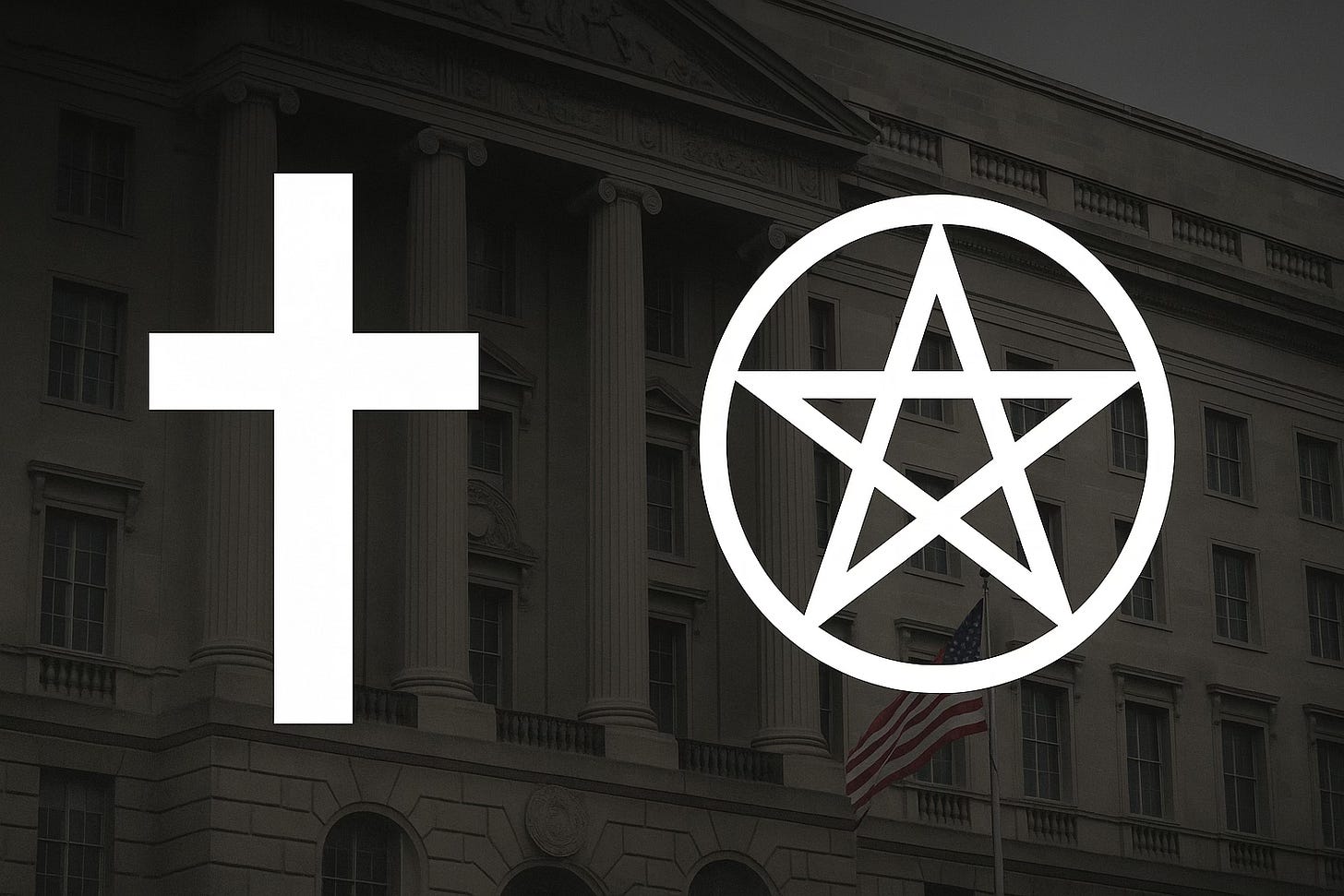Would This Policy Protect a Wiccan?
If religious freedom only protects the majority, it’s not freedom. It’s favoritism.
💬 Note: Comments on this post are open to all subscribers—free and paid. I want to hear your take.
The Gist
The federal government now allows employees to promote their religious beliefs in the workplace—as long as it’s not considered harassment. On paper, it applies to all faiths. But in practice? The policy risks favoring Christian expression while marginalizing minority beliefs. This piece explores how quickly “religious freedom” can become spiritual pressure—especially when power and rank get involved.
The federal government just handed out a new memo that’s flying under most people’s radar—but it shouldn’t. On July 28, the Office of Personnel Management (OPM) told federal employees they can now promote their religion openly in the workplace. That includes recruiting coworkers, starting prayer groups, and discussing their beliefs—as long as it’s not considered harassment.
Some people are already celebrating it as a win for religious liberty.
But here’s the real test:
Would this policy protect a Wiccan?
Or a Muslim? A Buddhist? A Satanist? An atheist who’d rather none of it be brought up in a professional setting?
Because if the answer is no—or even “it depends”—then this isn’t about liberty. It’s about power. And it’s blurring the line between personal faith and government endorsement.
⚖️ This Isn’t Just Any Office
In most workplaces, a little religious talk among coworkers might not be a big deal. But the federal government isn’t a private company—it’s the government. The very institution that’s supposed to remain neutral when it comes to religion. That’s what the First Amendment demands.
The Free Exercise Clause gives us the right to believe—or not believe—what we choose.
The Establishment Clause says the government can’t take sides.
When federal agencies start giving the green light to religious expression at work—especially if that expression mostly flows in one direction—you’re no longer just protecting speech. You’re tilting the scales.
🪖 What “Religious Freedom” Felt Like to Me
This isn’t just theory for me.
When I was in the Navy, I was dealing with a medical issue during my last six months of service. My chain of command told me to talk to the Command Master Chief. I was hoping for some help navigating the red tape.
Instead, I got a sermon.
He told me his church could help me get through it. I said no thank you. Politely. More than once.
That didn’t stop him.
He started cornering me whenever he could—buttonholing me in the hallway, dropping by my office when I wasn’t there, stuffing religious pamphlets into my manuals and desk drawers. I kept saying no. I kept it respectful.
Eventually, he got pissed.
He started dressing me down over nothing. Every time I crossed his path, he’d chew me out for some imaginary infraction. And he knew—he knew—I was already under strain from the medical situation and the stress it was causing.
That experience was a factor in what eventually became a breakdown.
So when I hear that federal employees—some of them supervisors—will now be free to recruit for their religion at work, I don’t think about liberty.
I think about what it’s like to be a junior sailor with no backup, trying to do your job while someone in authority pushes faith like it’s an order you can’t refuse.
🧪 Let’s Run the Wiccan Test
Picture this.
You’re a federal employee. Your coworker, a Wiccan, invites you to a full moon circle after hours. Maybe they have a goddess figurine on their desk. Maybe they talk about the Wheel of the Year in the breakroom.
Are they protected under this new policy?
They should be. But be honest: would they get the same benefit of the doubt as a Christian sharing a Bible verse or inviting someone to church?
Probably not.
And that’s the problem.
Religious liberty isn’t liberty if it only applies to what makes the majority comfortable.
🧨 Faith and Power Don’t Mix
Let’s say it’s not your coworker, but your boss. They start talking about their faith in one-on-ones. Maybe they hand out invites to a prayer group. Maybe they casually mention that people who “live right” tend to do better in life.
What do you do?
You nod. You smile. You say “sure” even if it makes your skin crawl—because this is someone who controls your performance reviews and promotions.
That’s not liberty. That’s pressure dressed up as piety.
🕯️ This Door Better Swing Both Ways
If this policy stands—and it probably will—it better swing both ways. That means:
If Christians can host prayer groups, so can Muslims.
If a cross on the desk is okay, so is a pentagram.
If religious flyers are allowed in the breakroom, then so are atheist ones.
Because once the government opens the door, it has to leave it open for everyone. If it doesn’t, it’s not defending religion. It’s picking winners—and the Constitution doesn’t allow that.
📌 The Bottom Line
You can’t put a cross in the public square and then kick the pentacle off the lawn.
Religious liberty is worth defending. But if it becomes a tool to promote one belief system while quietly shutting out the rest, we’ve missed the point entirely.
The government doesn’t belong in your church, and your church doesn’t belong in the government office. Keep your faith. Share it if you want. But don’t confuse freedom of religion with freedom to dominate.
Let’s be honest about what this memo really opens the door to—and let’s make damn sure that door stays open for everyone, or no one at all.
💬 Have a story like this? Drop it in the comments. I’d love to hear from you.



